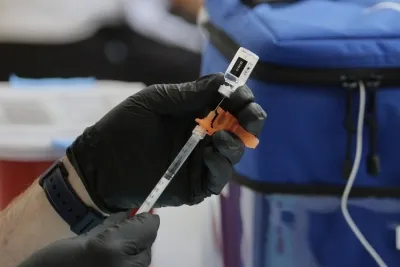Is Bangladesh Facing a COVID-19 Vaccine Crisis Amid New Variant Surge?

Synopsis
Key Takeaways
- 3.2 million doses of vaccines are currently available.
- COVID-19 cases have surged to an infection rate of 9.51 percent.
- A vaccine committee will be formed to address procurement issues.
- Public interest in vaccination is waning due to misinformation.
- Over 29,500 deaths have been attributed to COVID-19 in Bangladesh.
Dhaka, June 20 (NationPress) Bangladesh is currently grappling with a shortage of vaccines to combat the newly identified sub-variants of the Omicron variant of COVID-19. The country's Directorate General of Health Services (DGHS) has highlighted that there are merely 3.2 million doses of existing vaccines available, which are set to expire in a few months, as reported by local media.
As per a report by the Bangladeshi news outlet UNB, COVID-19 infection rates have significantly increased across the nation over the past month. Data from the Institute of Epidemiology, Disease Control and Research (IEDCR) in Dhaka indicates that 134 cases tested positive out of 1,409 samples in May, marking a sharp rise in the infection rate to 9.51 percent, the highest recorded in Bangladesh from January to May 2023.
Halimur Rashid, Line Director of the Communicable Disease Control (CDC) unit at the DGHS, stated, “Currently, there are approximately 3.2 million doses of vaccines available. No new vaccines for the sub-variants have been delivered yet. Nonetheless, procurement efforts are underway, and a vaccine committee will soon be established to facilitate swift decision-making.”
In the meantime, despite the rise in COVID cases, public interest in vaccination appears to be dwindling. Rashid pointed out, “Numerous unfounded rumors about vaccines are circulating, lacking any scientific foundation.”
The DGHS reported a total of 28 new COVID-19 cases in Bangladesh as of Thursday morning, bringing the total number of confirmed cases in the country to 2,051,932.
The nation recorded its first COVID-19 death of the year on June 5, when a man succumbed to the virus in the capital, Dhaka. According to DGHS data, over 29,500 fatalities due to COVID-19 have been reported in Bangladesh since the onset of the pandemic.
Experts have underscored the necessity for early preparedness to address the spread of new sub-variants, noting that proactive measures can effectively reduce both infection and mortality rates.









